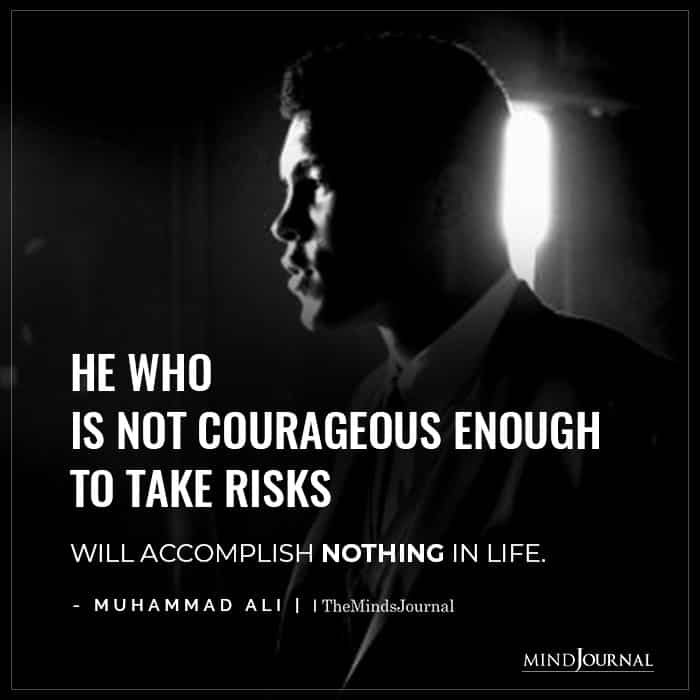Do you want to be more assertive and forceful? What’s stopping you? To learn how to be courageous and brave in life, read the following article carefully.
Courage can be taught. Carefully craft and cultivate opportunities for people to discover courage on their own.
“I learned that courage was not the absence of fear, but the triumph over it.” Nelson Mandela
About a year ago I was struggling to teach one of my business students how to promote herself at networking events. She was an excellent student — smart, conscientious, and deeply motivated — and by the end of our sessions, I felt she had it down. And so you can imagine how shocking it was to me when I found out she never actually went to the events that we had prepared for. It was just too overwhelming to her, despite the fact that she knew exactly what to do and what to say.
And that’s when it struck me. What I was teaching her — and what she actually needed were two completely different things. I was focusing on the tips — the script — the how-tos. But that’s not what she needed. You can pick that up pretty much anywhere. What she really needed me to help her with was courage: the ability to take that leap — face down the fear she was feeling — and go off and network… even if it sent shivers down her spine. And on that front, I pretty much failed.

Ever since then, I’ve been focused on courage and working hard to integrate it into the training and mentoring work I do. And I’d like to suggest you consider doing this as well.
How To Be Courageous
Here are a few tips to get you started:
Tip 1: Create A “Forcing Mechanism.
People need a nudge to step outside their comfort zones so they can discover the courage that they had all along within themselves. That’s why I always build a “nudge” into any training or teaching I do. For example, in one course I teach, I require students to choose a situation outside their comfort zone — like networking, for example — and then go off and actually do it — three times, in fact, during the semester.
Of course, I also set them up with a mentor and teach them some skills they’ll need to succeed, but the point I want to make is that the nudge is the first critical step, and without it, courage is a very unlike outcome.

Tip 2: Help People Find Their Own Path Towards Courage
There’s no generic path towards courage. That’s why I work hard on helping people develop this capability on their own terms — which means in their own way and often according to their own timeline.
Sometimes this means using particular strategies that work for them — but which might not necessarily work for another person. For example, if a person fears networking, and especially doing so in a large, noisy room, they might choose to participate in smaller events, perhaps going along with a friend or colleague.
Or if they are terrified of feeling judged when participating in a meeting, they might arrange to sit in a place where they literally can’t see others, and can just focus on the person running the meeting. There is a myriad of ways people can equip themselves to confront the situations that frighten them the most.
Also Read: 8 Steps To Improving Your Self-Esteem
Tip 3: Build Reflection Into The Process
Courage needs to be nurtured. People can’t be kicked (or nudged) out of their proverbial nests, without an opportunity to reflect upon — and process — their experiences.
This can be done with a coach or a colleague or mentor or a group, with the goal of recognizing — and also celebrating — the progress they’ve made towards achieving their goals.
Tip 4: Create A Safe Setting… But Not Too Safe A Setting
You don’t want to throw people to the wolves immediately, without the capacity to have some degree of success. But you also don’t want to unnecessarily shield people from challenging situations either.
There’s a benefit in falling down and learning you can pull yourself back up, so as you work on fostering courage, offer people “stretch” opportunities for trying out skills in challenging situations.
Also Read: How to Be More Charismatic: 3 Tips
They might indeed fail — and that’s OK, as long as you can help them build the resilience that comes from getting right back up and trying again.
In the end, courage is an “inside job” and a very personal journey. And you obviously can’t “teach” people courage in the same way you’d teach math, statistics, or science. But what you can do is carefully craft and cultivate opportunities for people to discover courage on their own. And if my experience is any guide, I think you’ll be pleased with the return on investment.
Written by: Andy Molinsky Originally appeared on: Medium Republished with permission
So, to sum it up, if you are wondering how to find courage in life, look inward, find your fears, and start right there with the help of the 4 above-mentioned points. Now as you have found the answer to the question of how to be more courageous in life, hopefully, you will share the above article on ” How To Be Courageous” with anyone who you might find it valuable and helpful.











Leave a Reply